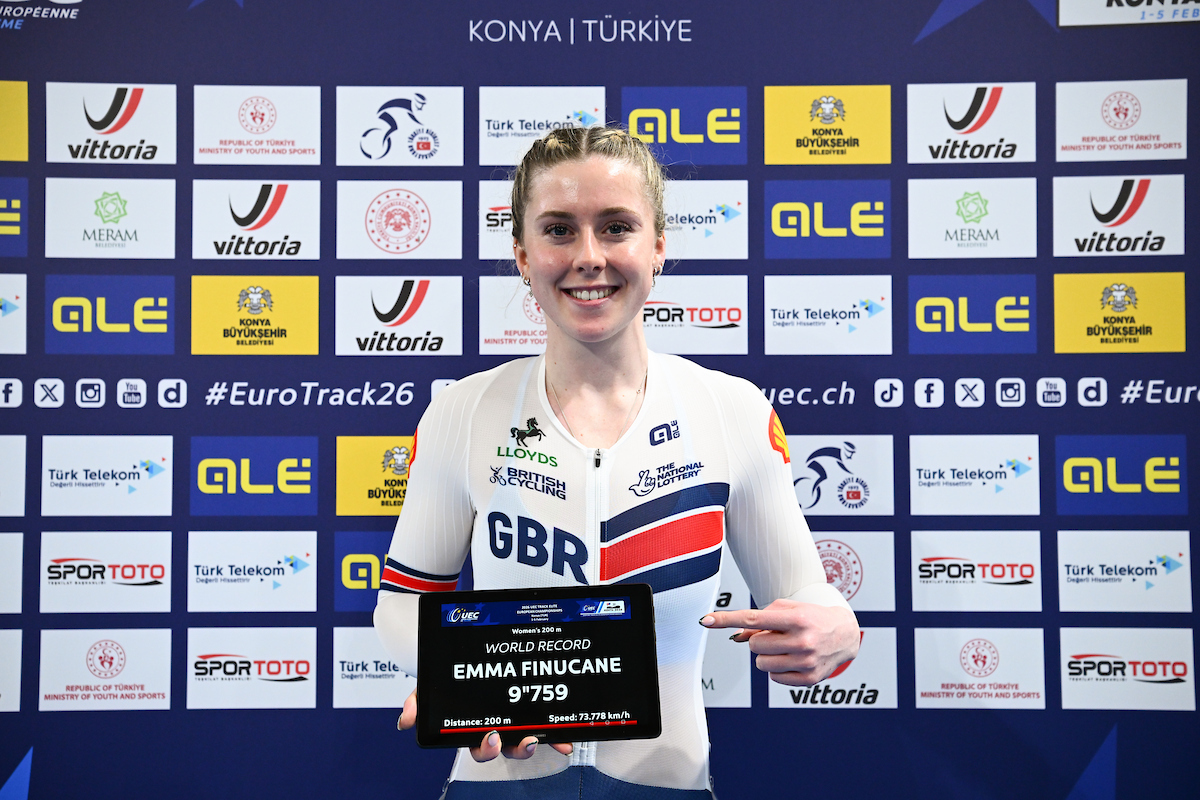Six moments that defined the 2025 Vuelta a España
The turning points of a brutally difficult race and the 'saddest Vuelta in history'
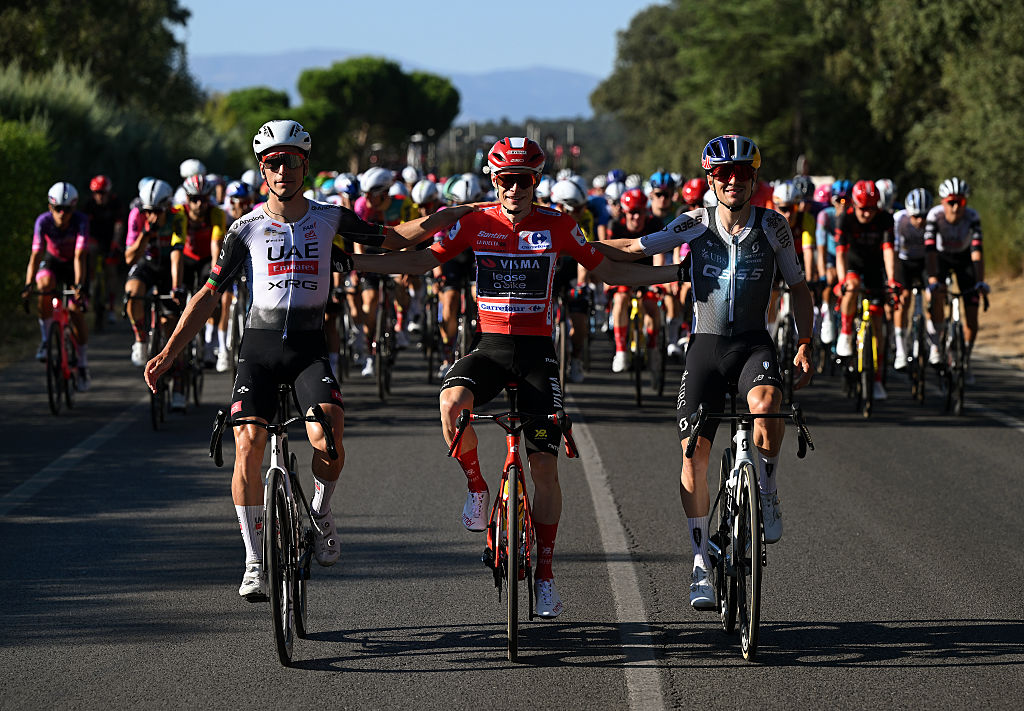
It's been an incredibly fraught edition of the Vuelta a España this year, 'the saddest Vuelta in history' according to Spanish newspaper AS, and one where political and military conflict far beyond the borders of Spain indirectly caused some of the defining images of the 2025 race.
On the one hand, the victory for Jonas Vingegaard (Visma-Lease a Bike) meant the double Tour de France winner could both take a hugely prestigious and challenging win, and simultaneously regain valuable additional momentum in his longer-term battle to take on Tadej Pogačar (UAE Team Emirates-XRG)
But regrettably, and for reasons that everybody knows, Vingegaard's and the other top riders' hardf-ought achievements could only be celebrated in public in a makeshift podium in a hotel carpark on a Sunday night. A heartwarming finale to their Vuelta in some ways, given the absence of formal celebrations.
But whilst a reminder that their success was achieved in difficult circumstances made it only more impressive, the surreal nature of the last act of the Vuelta also showed how the race had found itself in the eye of a much bigger storm, too.
Here, then, is Cyclingnews' take on six key moments of the 2025 Vuelta a España.
Stage 6: Juan Ayuso drops out of the overall battle
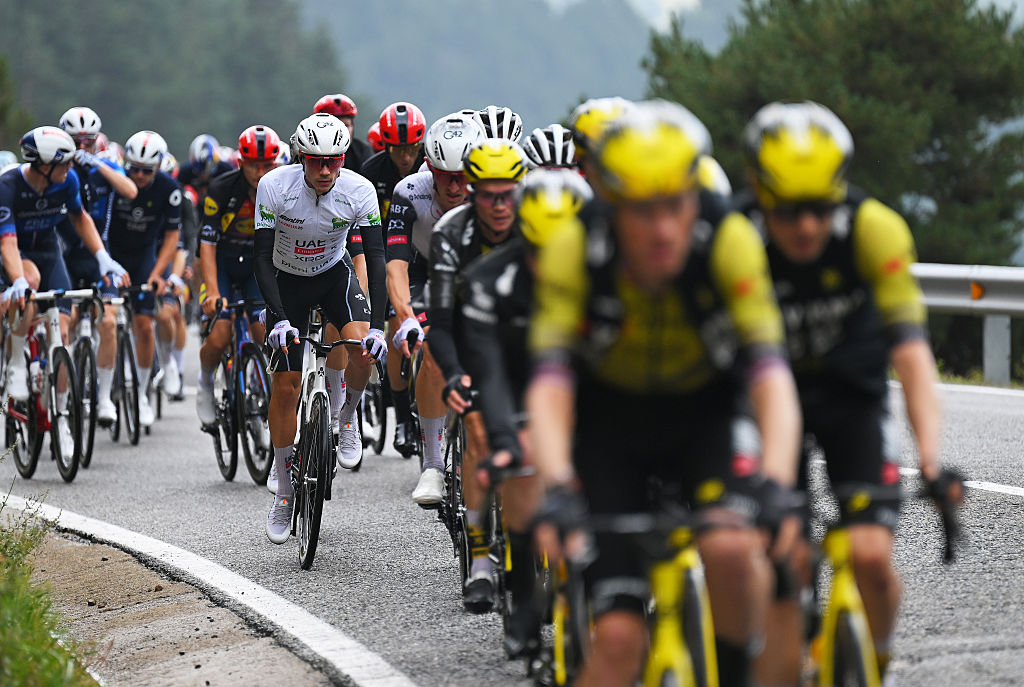
Five kilometres from the top of the final ascent to Pal on stage 6, Juan Ayuso dropped out of the main group of favourites, and simultaneously, as his time loss reached over seven minutes by the finish, he said farewell to a lot of things.
First and foremost, Ayuso bid farewell to any chance of repeating his 2022 breakthrough podium finish in the Vuelta a España, let alone taking on the role of principal challenger to top favourite Jonas Vingegaard.
The latest race content, interviews, features, reviews and expert buying guides, direct to your inbox!
Even before the race reached Spain, Vingegaard had already shown that when he said he wanted to win the Vuelta, it wasn't idle talk. A sizzling acceleration to victory on the Limone Piemonte summit finish on stage 2, coupled with a fine third place behind surprise stage winner David Gaudu (Groupama-FDJ) and an unusually uneven Mads Pedersen (Lidl-Trek) on the uphill drag to stage 3 at Ceres, saw Vingegaard briefly in red and with his credentials for victory in Madrid fully confirmed.
However, UAE Team Emirates-XRG then moved into the GC driving seat with their surprise victory in the team time trial in Figueres, with Ayuso coming to within eight seconds of Vingegaard overall, João Almeida tied on time and moving into third. The chants of 'UAE, UAE' as they celebrated their victory suggested that as a squad, and individually, Vingegaard was going to have a major fight on their hands.
Instead in the ascent to Pal, that strength split in three utterly different directions. Jay Vine, part of the break of the day but well down on GC, was given a green light to go for a stage win and start his mission of repeating his 2024 King of the Mountains title. Almeida, following the wheels of Visma-Lease a Bike, remained in contention for GC, and chased down the one moment of overall action when Vingegaard followed ephemeral GC challenger Giulio Ciccone (Lidl-Trek) up the road.
As for Ayuso, he moved off on his own path, subsequently claiming – not totally convincingly – that his role as overall challenger had been thrust upon him by the Spanish media and that he had never been able to rebuild after his Giro d'Italia abandon for the Vuelta.
Ayuso did not abandon, and subsequently delivered two spectacular stage wins. But the end of his GC bid also simultaneously spelt farewell to his last chance to deliver a top overall performance with current team UAE, put paid to the popular notion that UAE could use their two top riders to try and sink Vingegaard and poured added fuel on the speculation surrounding his imminent exit from the team. Speculation which subsequently proved to be 100% correct.
Stage 9: Jonas Vingegaard makes surprise gains on João Almeida
"It's a motorway and nothing will happen on GC at all" was how double Vuelta a España winner Pedro Delgado cheerfully described the nature of the Valdezcaray summit finish on stage 9. On paper, it was very hard to disagree with his prediction.
Back for the first time since 2012 (where very little happened barring a spectacular spat between then-Movistar racer Alejandro Valverde and Team Sky after they attacked by forming an echelon just when he had crashed) Valdezcaray looked like one of the most inoffensive of the entire race.
Rather than the typical ultra-steep goat-track seemingly leading nowhere so beloved of the Vuelta, only the opening couple of kilometres, with a few curves on a badly surfaced road reaching 10% in dense woodland, qualified as challenging. After that, as the road broadened out on much better tarmac, and the it dropped to a much less daunting 3% gradient. Essentially it seemed impossible, barring a major miscalculation on somebody's part, for anything significant to happen on GC.
But it did. "Jonas radioed through, can somebody launch me? And I was like 'when?' and he said 'now'," Matteo Jorgenson told reporters as a sudden rainstorm pelted the peloton at the finish. And sure enough, as UAE dithered and failed to respond quickly, Vingegaard was suddenly up the road.
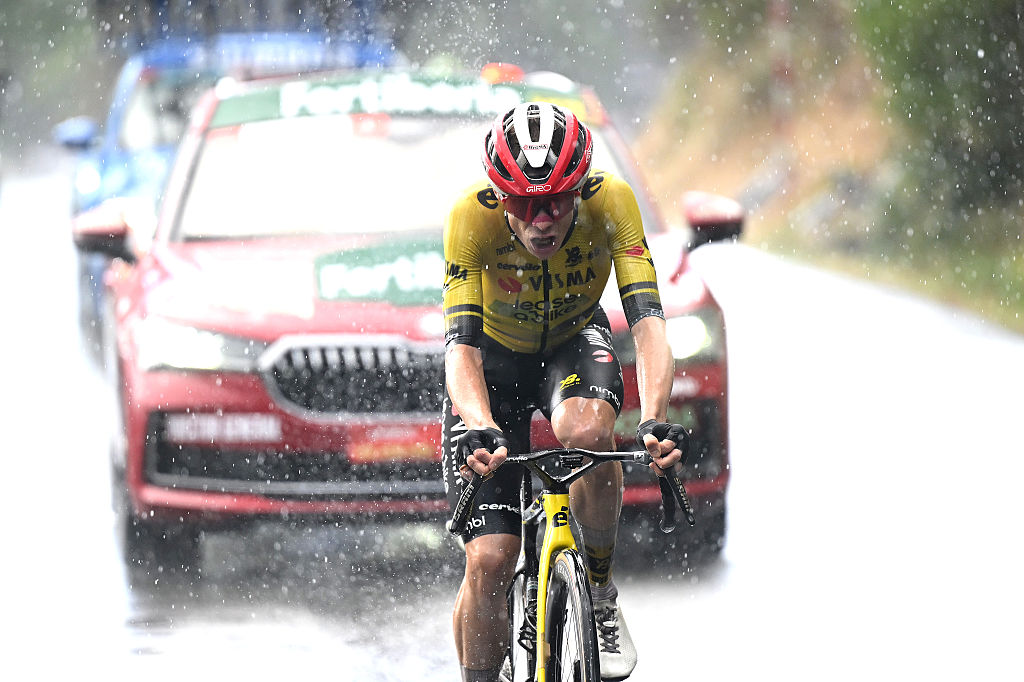
Almeida, now UAE's only GC contender, received some brief support from Jay Vine, but his "I lacked teammates a bit" reaction was the understatement of the Vuelta. With backing, he could have closed the gap quickly. But Ayuso was long gone, saying he felt tired after his previous day's spectacular stage win at Cerler, Vine's support was intermittent, and none of the other potential climbing backers were there when it mattered.
Riding with only Tom Pidcock (Q36.5) as a sporadic helper – "he told me to grow some balls" was how the Briton recalled Almeida's colourful encouragement for him to take a turn – as Vingegaard hammered away in time trial mode it was clear that Almeida was going to have to dig very deep to respond. The gap widened to 30 seconds at one point, before Pidcock and Almeida managed to shut off the leak and even reduce it to 24 by the finish. But in a race which seemed destined for many days to be taken by seconds, the time gained by Vingegaard constituted a significant blow for the Portuguese racer.
Most importantly, though after three successive stages won by UAE, Vingegaard's second win in a week gave Visma the upper hand once again – just when the hardest mountain challenges were looming into sight.
Stage 11: The protests hit the Vuelta a España
You could see it coming, but when it arrived, even so, it constituted a massive shock. After days of protests and brief attempts to shut down a stage of the Vuelta a España, things finally reached a dramatic, searing head for the first time – but not the last – on the streets of Bilbao.
Hundreds of demonstrators, angered by the ongoing presence of Israel-Premier Tech in the race, caused stage 11 to be stopped three kilometres from the finish. It was the first of five such major alterations because of the protests and the first time a Grand Tour stage had been partly neutralised due to political demonstrations in 47 years – since 1978 and, perhaps coincidentally, in the Basque Country as well.
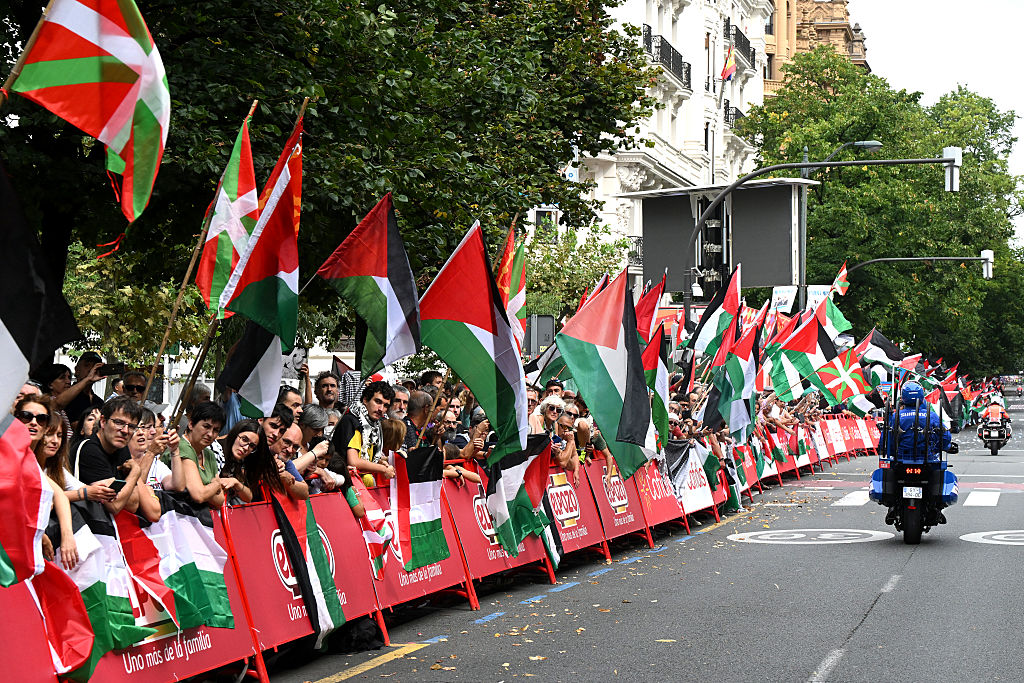
No winner, no podium ceremony, no press conferences. Instead, huge crowds of demonstrators faced off police as they threatened to invade the finish line. That the race would be severely affected could have been predicted when the riders came through the finish line a first time for a local circuit, and the passageway left for them to move through next to the forest of Palestinian flags was already a very narrow one. On their approach the next time, as the tension heightened and the clashes grew more serious, with the road closed off completely.
By that point in the race, organisers had already radioed through to the teams that the finish would be partially cancelled. But the communicating of the full effects – and that the race would end at three kilometres to go – came after Jonas Vingegaard (Visma-Lease a Bike) and Tom Pidcock (Q36.5) had gained time on all their rivals on the Alto del Pike and were in a position to duel for the win.
The duel never happened. "My best day and my worst day in the Vuelta, all at once," Pidcock said. "I could have gone for the win, I was feeling really good, but then that happened."
The Briton was left wondering 'what if?' about his own chances of a first Vuelta stage, and the Vuelta itself was left wonder what could happen from here on to the entire race. "Have we just seen our last stage winner?" Jonas Vingegaard later asked rhetorically. Nobody had the answer to that question – the Vuelta was heading into waters last charted in 1978 – and there was no way of measuring the depths.
Stage 18: João Almeida breathes some fresh TT life into his GC bid
When the Vuelta a España peloton, whistles at the ready and windjackets covering their race kit, began the twisting long descent from the ninth of ten summit finishes at Alto de El Morredero, the sense that João Almeida's bid for the GC had hit the buffers was overwhelming.
Far from following up his superb containment of Jonas Vingegaard on the Angliru with fresh attacks on the Farrapona summit the next day, instead Almeida seemed to be struggling slightly, even ceding time to Vingegaard in the bonuses in the uphill sprint for the line. Then at El Morredero's summit finish, it was a very similar story, with another two second loss and Almeida struggling to maintain contact in places. "I'm not great but neither is Jonas," Almeida said afterwards. "We're all in the same boat."
With the glorious benefit of hindsight, it subsequently became clear – once he'd discussed it after stage 20 – that Almeida was getting ill with the flu, and by the third week on the climbs he was more engaged in damage limitation than risk going too deep. But the flat was another story, it seemed and in the time trial in Valladolid on stage 18, for all it was reduced from 27.2 kilometres to 12.2, Almeida regained ten seconds on Vingegaard.
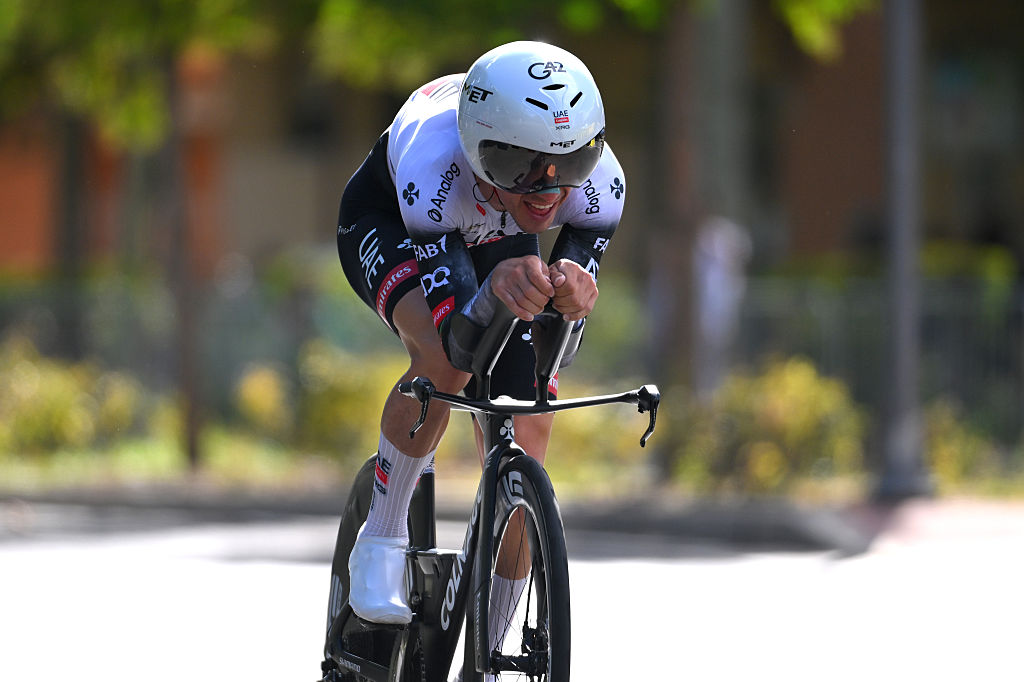
For such a short distance, that was not a bad gain by anybody's book, and the question of whether the UAE leader would have been able to get more time on Vingegaard remains debatable. But as Almeida himself remarked, "life is based on ifs" and the potential gains that could have been made by the Portuguese rider allowed for an abrupt rise in the speculation that he might – might – be able to turn the tables in what remained of the race.
The loss of four of those hard-earned seconds the next day when Mads Pedersen generously opted not to go for an intermediate sprint so fellow Dane Vingegaard cou;d take them instead set the pendulum imperceptibly swinging back in the Visma leader's favour though. And more was to come on the Bola de Mundo.
Further down the GC classification, Tom Pidcock's ability to gain three seconds on Jai Hindley also augered well for the Briton. But whereas Pidcock looked to be heading into much better shape for the crunch summit finish at La Bola del Mundo, for Almeida the 'race of truth', as the time trials are nicknamed, actually turned out to be a 'false dawn'.
Stage 20: Jonas Vingegaard stamps his authority on the Vuelta a España's final summit finish
It was a long time coming, and the Vuelta had arguably come its closest yet to grinding to a halt when protesters staged a sit-in at the foot of the Bola del Mundo climb and it was only by using a sliproad that the peloton could slip past. But slip past they did and after UAE Team Emirates-XRG finally delivered their most cohesive display yet of support for Almeida, everything looked as if the Portuguese rider could, finally, go for broke on the final summit finish.
Instead, it was Vingegaard who stole the show, and in a way that we'd be waiting for the whole of the Vuelta. Stage 9's win on Valdezcaray had been a stunning success, but it felt more like an opportunistic slash-and-grab victory, as much due to to UAE's incompetence as Vingegaard's flash of inspiration. Since then, Vingegaard had been playing it defensively, shielding his second-week illness with claims that "we choose our moment to attack." But that moment had never come, and it was only in the last setpiece battle of the Vuelta, the grinding, cement-filled, slopes of the Bola del Mundo, that with perfect timing, Vingegaard turned in the stunning performance we'd expected.
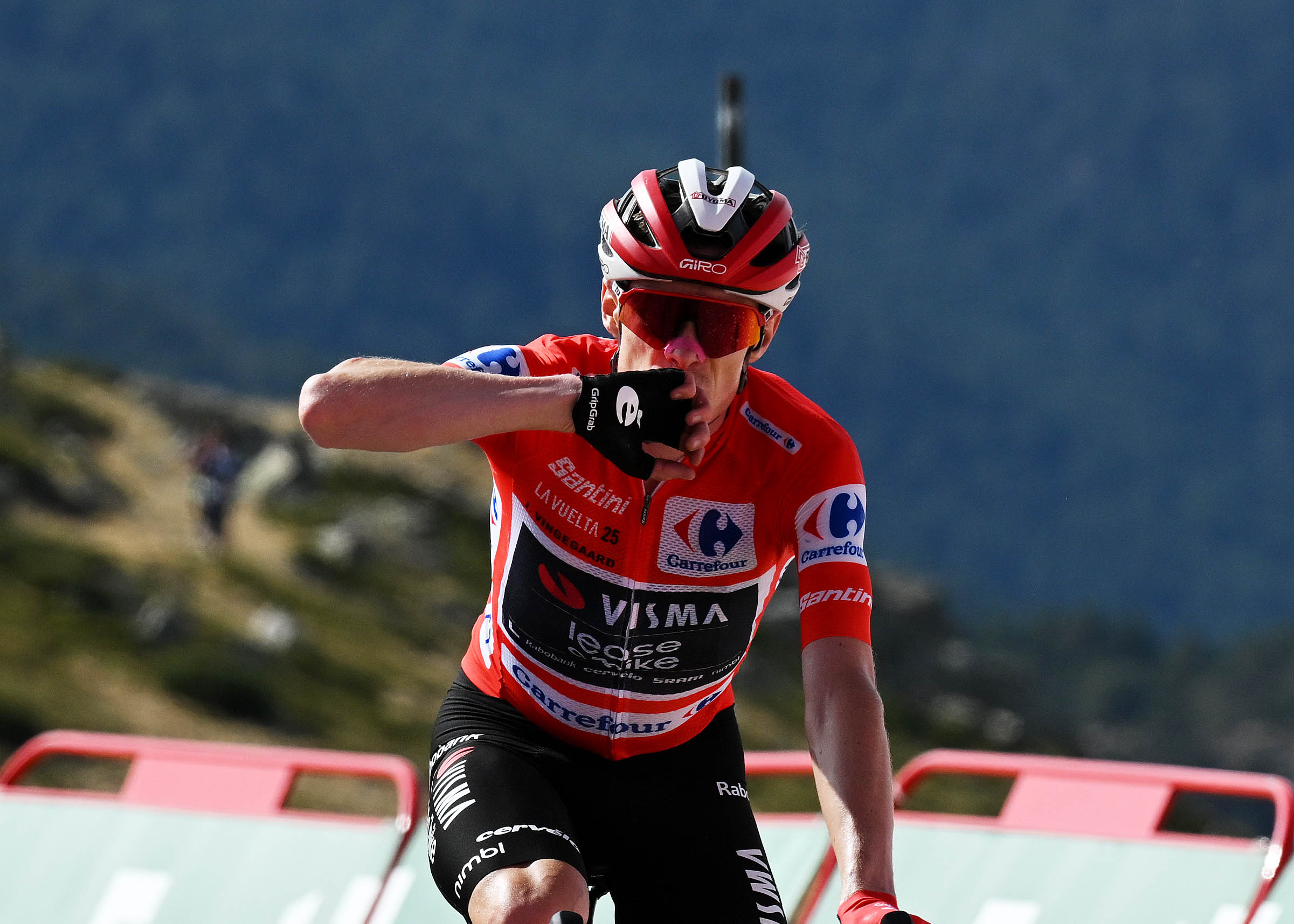
In a way, this was like Pogačar in the Montmartre stage of the Tour de France, finding extra energy to go for one last win after a lacklustre third week and looking, perhaps, for a message to send his rivals for next July. It's never too soon to start winning next year's Tour, after all.
But Vingegaard's victory, breaking away on the 25% slopes of the Bola del Mundo, was arguably even more significant. It not only confirmed his status as the rightful leader of the Vuelta on the very last opportunity, but also reminded the world that when he's at his best, no mountain is too tough for Vingegaard to conquer. You couldn't help wondering, in fact, if Tadej Pogačar had been watching from his hotel room in Canada and what he made of it, too.
The final was also the moment, too, of plenty of other storylines finding a resolution. Tom Pidcock confirmed the Vuelta was the breakthrough result he looked for when it came to finishing on the podium, just fending off Jai Hindley. And Matthew Riccitello (Israel-Premier Tech) also took a fine best young rider's award after Red Bull's Giulio Pellizzari cracked on the lower slopes of the Bola del Mundo.
But for the local racing scene, the results from the Bola del Mundo were as desolate as the empty stone-scree slopes leading to the radio tower at the sumit. For the first time in the history of the race, the absence of any home rider from the top ten overall represents a very worrying development. Yes, up-and-coming Carlos Rodríguez (Ineos Grenadiers) and multiple podium finisher Enric Mas (Movistar), were missing from the Vuelta line-up, while Ayuso's focus on stage wins arguably didn't help, either.
But while there were plenty of up-and-coming foreign stars in the top 10 and even the fleeting red jersey holder of the second week, Torstein Træen (Bahrain Victorious) made it home in a promising ninth place overall, Spain was left savouring a Vuelta with its worst GC result since Fernando Escartin placed 10th overall in 1996.
Stage 21: Protestors disruption sees the Vuelta end early
In some ways, like stage 11 of the Vuelta, we could see this finale coming. Ever since the Vuelta made its return from Italy on stage 5, the near-constant upheavals caused by the more disruptive pro-Palestinian protests – not, it should be underlined, the vast majority of them, which passed off peacefully – were a major factor. From stage 11 onwards, in fact, and after it became clear that Israel Premier-Tech would not be leaving early, the question of whether the Vuelta would make it to Madrid was as much an issue as the outcome of the race.
The police and organisers did their best to control events, but in total five stages were altered seriously because of the protests, including one summit finish and a drastically curtailed time trial. At times only the narrowest of margins has allowed the Vuelta to continue and finally it ended some 50 kilometres from its final finish line.
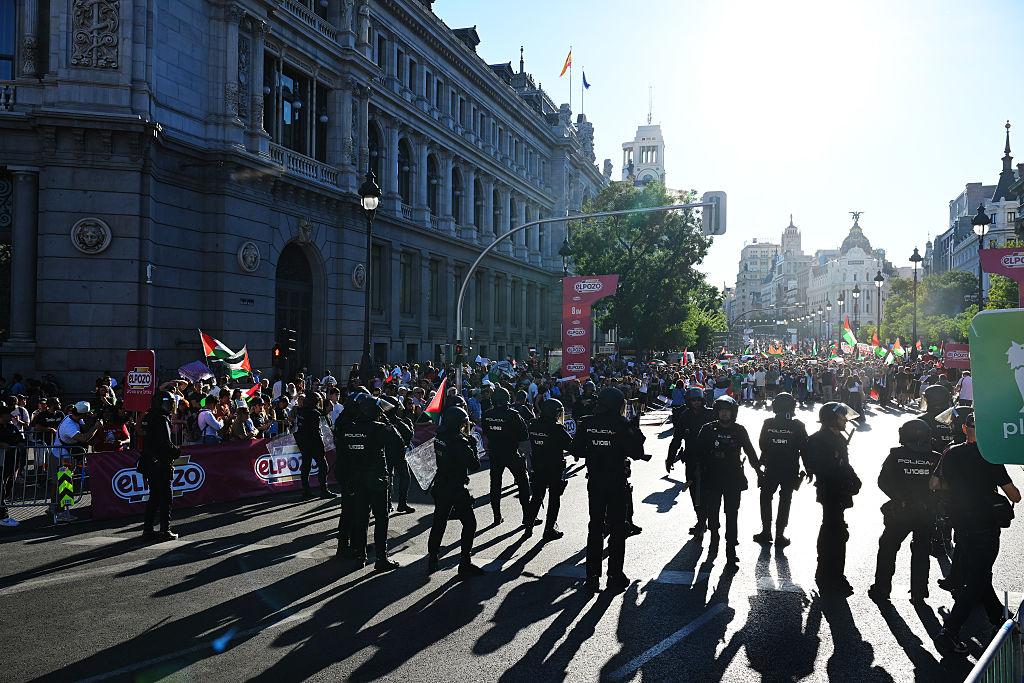
The last grim chapter was the hardest to take, for many, given the shocking violence of the images of barriers being ripped up, near-riots developing around the finish line and the abrupt end to three weeks of racing. That riders were upset, disappointed and even in tears as they headed for the team cars in the park somewhere on the outskirts of central Madrid is only logical.
Meanwhile, the political blame game has already started, after Prime Minister Pedro Sánchez had praised the protesters in the morning – while insisting on respect for the athletes, but not directly insisting the race be allowed to go ahead – whilst on the right, Sánchez's opponents have made political hay in their own way, insisting that this was a deplorable event. They even went so far as to compare it, in the case of Madrid regional president Isabel Díaz Ayuso, to the pro-ETA street violence of the 1990s. Meanwhile, the hard left congratulated themselves on having stopped the race, albeit on its last day and a largely ceremonial stage when the GC was more than decided.
Rather than look too hard at the colossal political battle in Spain or engaging in simple handwringing over the first Grand Tour to be ended early in 47 years, it's perhaps worth cycling looking at what it means for a sport that is arguably one of the most vulnerable to disruption.. That the Vuelta was in a permanent state of near-crisis for its last two weeks, culminating with its cancellation, is ample evidence that the questions the Vuelta has raised for other races will need some far more definitive answers than the UCI has currently provided. This isn't an issue that will go away just because the most turbulent Vuelta a España ever is now over.
Alasdair Fotheringham has been reporting on cycling since 1991. He has covered every Tour de France since 1992 bar one, as well as numerous other bike races of all shapes and sizes, ranging from the Olympic Games in 2008 to the now sadly defunct Subida a Urkiola hill climb in Spain. As well as working for Cyclingnews, he has also written for The Independent, The Guardian, ProCycling, The Express and Reuters.
You must confirm your public display name before commenting
Please logout and then login again, you will then be prompted to enter your display name.

